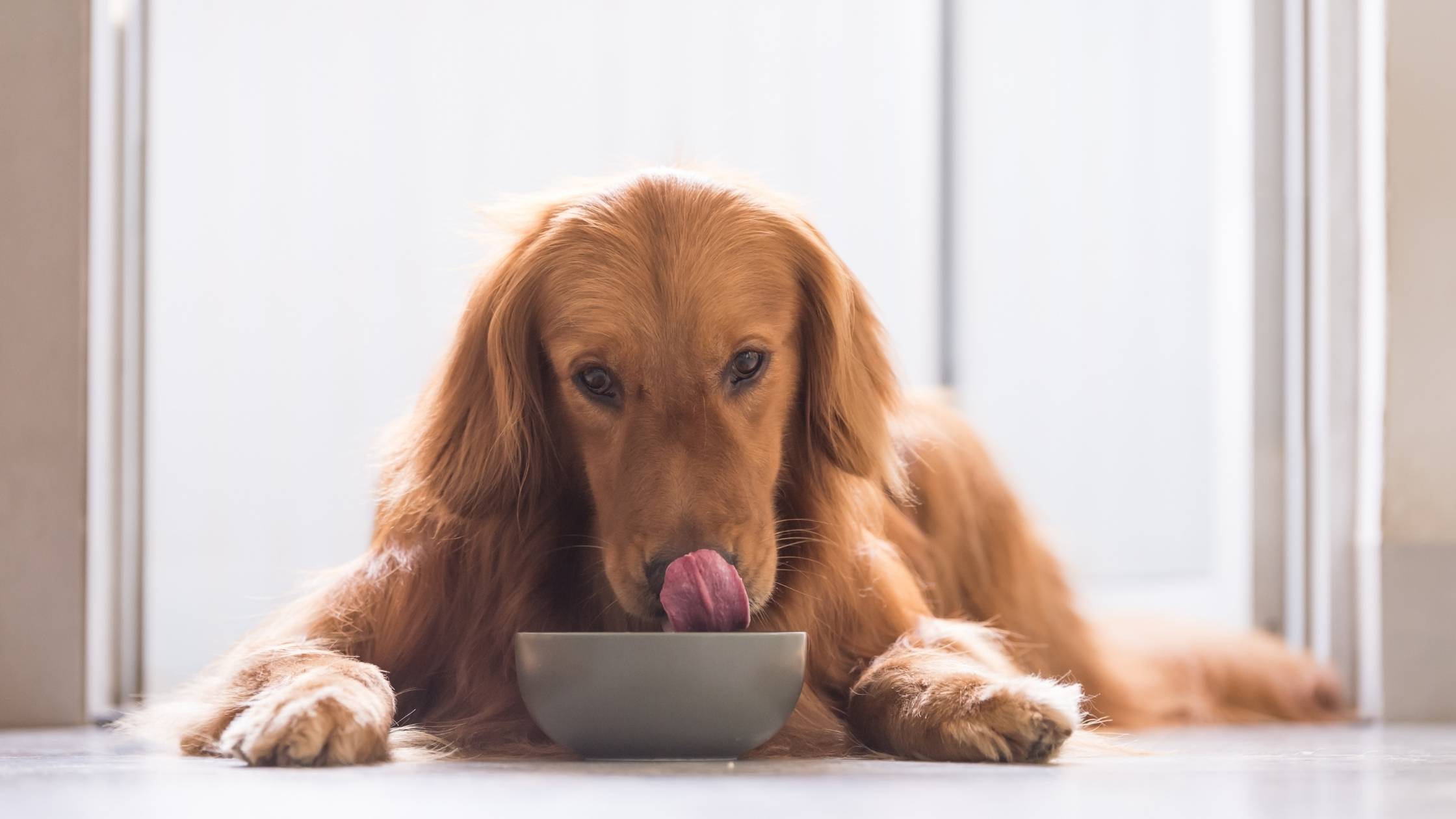Hummus is a healthy and nutritious food that is a key part of both the Greek and Middle Eastern diets. It’s a great food to add to your snack list if you need to keep your blood sugar levels in check, or if you’re trying to lose weight. We certainly know that it’s safe for human consumption, but can dogs eat hummus too? You might be reading this guide if you’re hoping to add hummus to your pup’s diet or are worried because he’s already eaten some.
Let’s dig into the details…
Can Dogs Eat Hummus?
So, can dogs have hummus? The answer to this question is usually no, dogs should not eat hummus, but this does depend on the ingredients which are in the hummus you’re planning to serve. If you’re at all unsure about the blend of hummus on offer, then you should always avoid giving hummus to dogs.
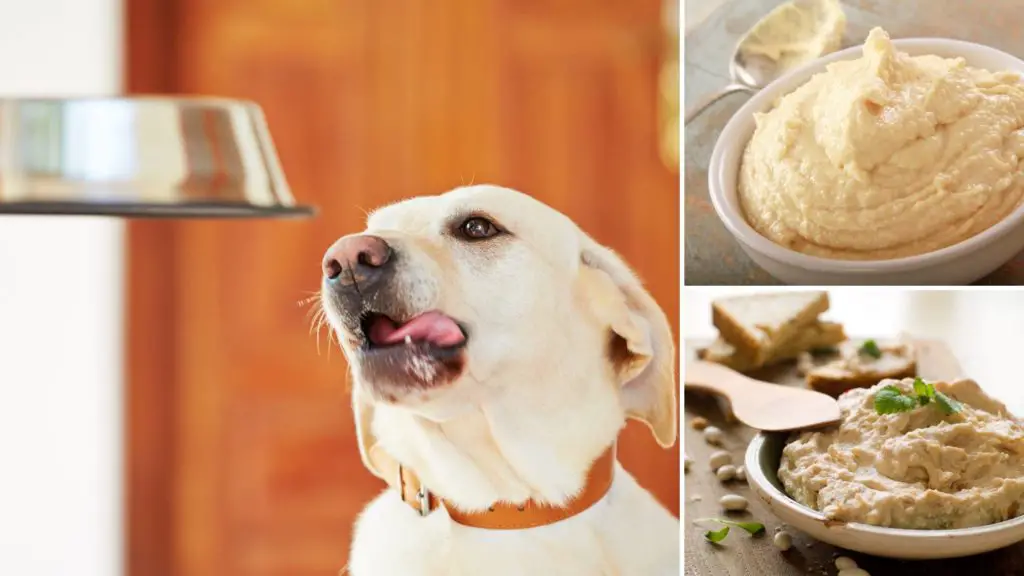
What is hummus made from?
When we think of hummus, the mind tends to go to the other foods you might serve it with including pitta bread, carrot sticks, bagels and the like. These are all fine for doggies and there will be no problem if your four-legged friend scoops up any crumbs or leftover bites from beneath the table. It’s the hummus you’ll need to keep out of reach, as its content can be particularly problematic for your pup.
So, why is hummus bad for dogs exactly? Traditional hummus is made with the main ingredient of chickpeas which are cooked and then mashed into a paste. You would then add other typical ingredients including onion, garlic, tahini, lemon juice and oil to get a truly tasty blend. It’s these extra ingredients that are dangerous for your pup.
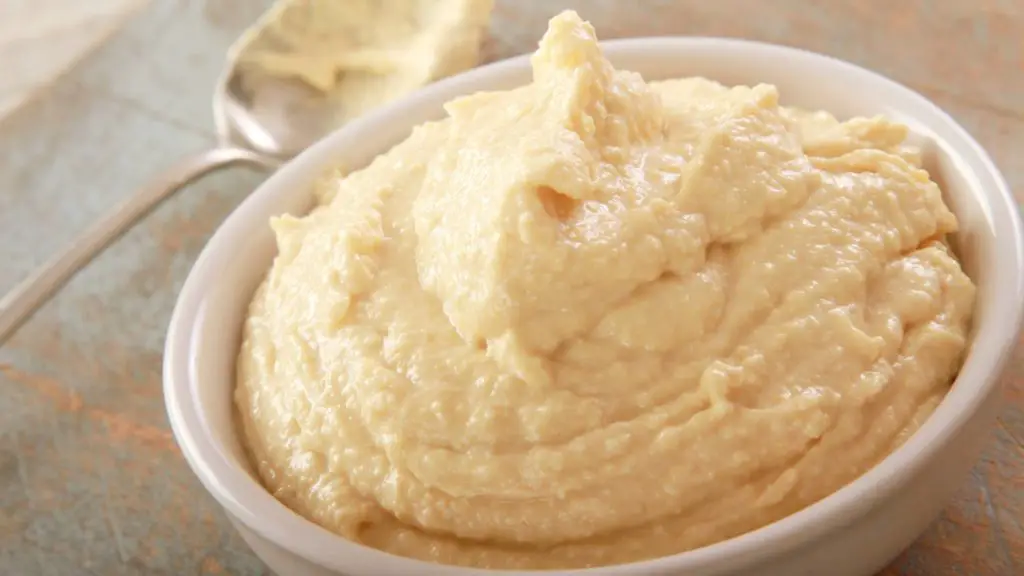
What should you do if your dog has eaten hummus?
As garlic is particularly toxic to your dog, you’ll need to be on your guard if you’re aware that your dog either has eaten or might have eaten hummus containing this ingredient. As with all dangerous foods, the quantity that has been consumed can impact how poorly your pup might be afterwards. If your dog has accidentally had a taste of it, then you might expect only minor symptoms, but if they’ve gobbled down a lot then they’re more likely to be poorly.
Typical symptoms after your dog has eaten hummus include:
- Vomiting
- Diarrhoea
- Drooling
- Abdominal pain
- Fatigue
- Pale gums
- Jaundice
- Pale mucus membranes
- Dark-coloured urine output
- Rapid breathing
In more serious cases, your dog might experience damage to its red blood cells, which could make them more likely to rupture. Anaemia would be another knock-on effect of having a toxic reaction to hummus.
Related Post: Can Dogs Eat Blackberries?
If you’re at all worried about your pup and know that they have eaten hummus in any quantity, then it would best to seek professional assistance from a vet as soon as possible. Don’t delay treatment as this could prove serious for your pet. If your dog is experiencing any of the symptoms on the list, call your vet immediately who will be well versed in why hummus is not safe for dogs.
Exploring hummus ingredients in more detail
Now we’re clear that hummus for dogs is a terrible idea, let’s take a look at the ingredients in more detail, starting with the humble chickpea.
Can dogs eat chickpeas?
The answer is yes, dogs can eat chickpeas. As an important part of a plant-based diet, chickpeas are incredibly nutrient-dense. They’re packed full of fibre which means that you feel fuller for longer, which is great if you’re drawn towards sugary goods that would give you an unhealthy energy boost.
People and pups who eat protein and fibre-rich foods such as chickpeas are less likely to have problems with gaining weight. You can also benefit from consuming key nutrients such as Vitamin A, B, potassium, magnesium and folate; the result of these is stronger eye health, enhanced immune systems and excellent cell recovery.
If you do wish to give chickpeas to your dog, then you can either cook and mash them into a paste or else serve them raw. They mix well with animal protein or vegetables. Remember that your chickpeas should be served pure, with no added seasoning or ingredients such as onions or garlic which are toxic for your dog.
If your pup has never eaten chickpeas before, or any other type of legume for that matter, then it would be best to take it easy when introducing them into the diet. For any dog who already has a persistent problem with gassiness, legumes such as chickpeas can make the situation worse. Breeds such as bulldogs may find chickpeas harder to digest for example.
If you’re happy to trial chickpeas, then just take it slowly and only offer a small portion at a time. Make sure you’re not introducing other new foods at the same time so that it’s easy to identify if your dog is struggling with chickpeas.
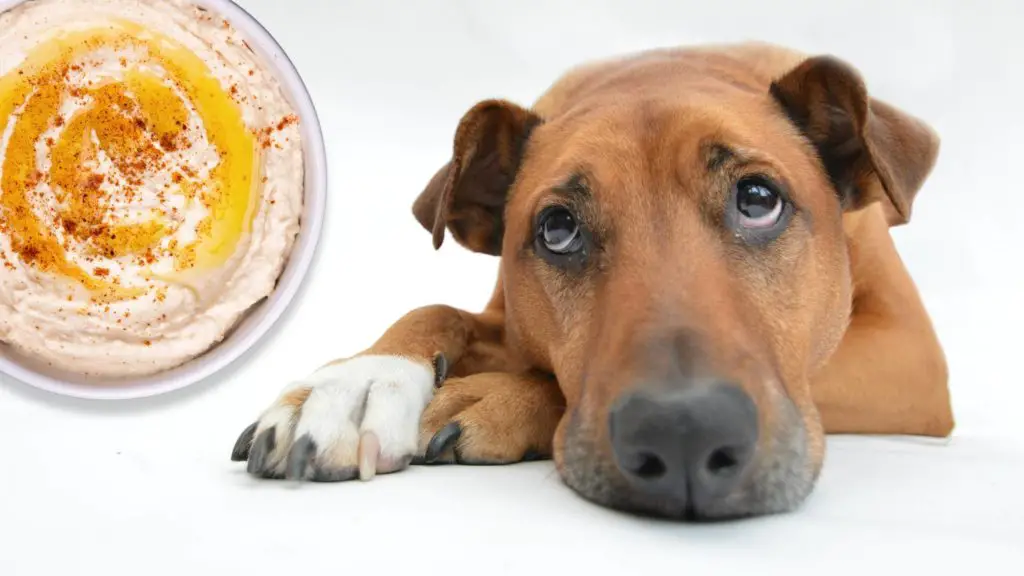
Why is garlic bad for dogs?
As we know that the answer to the question ‘can dogs have hummus?’ is a no, it’s time to explore exactly why that is. Garlic certainly isn’t the only ingredient in hummus that is dangerous for dogs, but it’s arguably the most toxic on the recipe list.
The metabolism of dogs acts entirely differently to how humans break down food. One of the greatest variations is with thiosulfate which is found in allium-derived foods. Any member of the allium family, which includes onions and garlic, but also leeks, chives and shallots, is toxic for dogs. However, garlic is said to be worst for dogs as it is roughly five times more potent than onions.
As we know hummus for dogs is dangerous due to its garlic content, it’s worth considering exactly how much your pup would have to eat to become seriously poorly.
Dogs come in all shapes and sizes, and those on the smaller end of the scale are more likely to become seriously poorly from garlic or hummus consumption due to the size of their internal organs. There are also some breeds of dogs, and cats for that matter, which are more sensitive to the effects of garlic. As a random guideline, your dog would need to eat around 15 to 30 grams of garlic per kg of bodyweight to become seriously ill from garlic toxicity. Keep in mind that the average garlic clove weighs in at around 3 to 7 g. Still, we’ve all known dogs to munch their way through large quantities of food they find tasty, so it’s always best to err on the side of caution and keep both your garlic and your hummus way out of reach.
Can dogs eat tahini?
Another key ingredient of hummus is tahini, so if you’re already aware that hummus is bad for dogs but you’re wondering if tahini is ok, then you’ll be pleasantly surprised.
Tahini is a mixture made from toasted sesame seeds which are truly delicious for both dogs and humans alike. It blends into so many other dishes or you can enjoy it on its own as a dip.
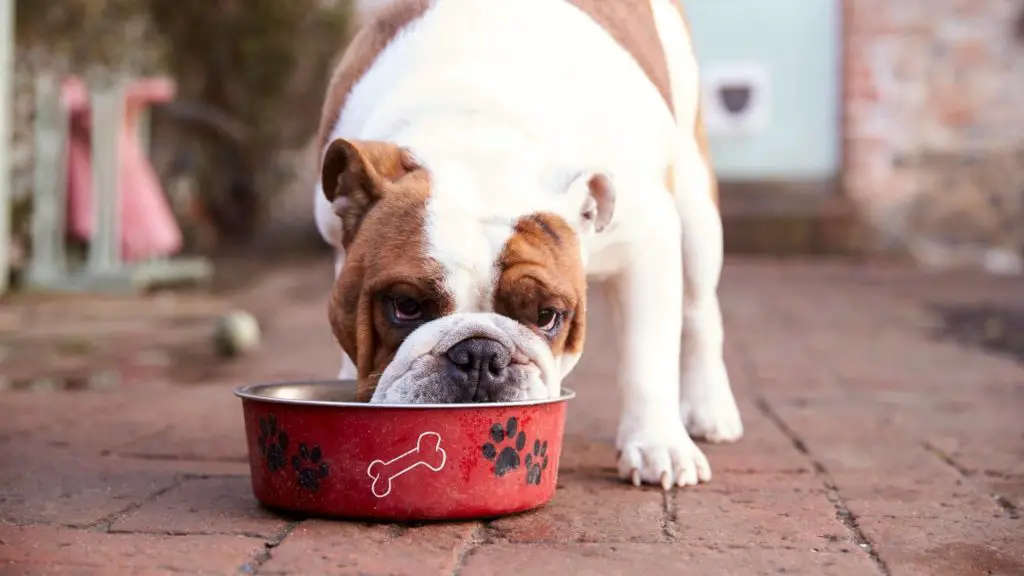
As the sesame seeds in tahini are not from the allium family and aren’t toxic to dogs in any other way, this ingredient is entirely safe for consumption. In fact, there are multiple health benefits found in tahini. From lowering cholesterol and your blood pressure to being a source of good fats, there’s every reason to celebrate tahini. The only possible problem you might have is if your pup eats too much of it, then they may find this hard to digest – this isn’t a case of toxicity, but rather seeds being tricky for dogs to process.
Is lemon juice ok for dogs?
If you’ve searched for advice on whether hummus is bad for dogs, then you might be frustrated to learn about yet another ingredient that is super healthy for humans but should be avoided by your canine friend. Yes, that’s right, another reason why dogs can’t eat hummus is due to the lemon juice that’s added to the recipe to give it that certain zing.
Lemon juice offers a distinctive taste to many recipes. Although it can be overpowering by itself, when mixed with other sweet or savoury foods, it can create some delicious recipes. From lemon meringue pie to lemon pasta, we humans simply devour this ingredient which is healthy for us too.
As a rich source of Vitamin C, lemon juice is great for supporting our immune systems, promoting weight loss and reducing the risk of cancer too. But what about dogs? Unfortunately, the exact same ingredient offers little to no nutritional benefits to the health of a canine. In fact, the acidic base of the fruit is just too much for many dogs to be able to handle. Ingesting lemon juice can cause vomiting, diarrhoea and lethargy in your pup. In the long term, this ingredient could also disrupt your dog’s delicate acid-base balance and just cause more problems than it’s worth.
Is hummus ok for dogs if it’s homemade?
So, you’re aware of the ingredients which make up your traditional, and usually your store-bought hummus, but can dogs eat hummus that you’ve cooked at home?
If you want to try giving dogs hummus which is plain and made from mashed chickpeas and tahini, then feel free to offer it as a light snack. Remember that most of your pup’s diet should be formed of vet-approved dog food to ensure that they receive the right balance of nutrients for their breed, body weight and any dietary concerns.
However, unless your vet says otherwise, there is usually nothing wrong with offering a small homemade snack so long as it is healthy and avoids unhealthy ingredients not covered in this article, such as salt.
If you’d like to try a safe hummus dogs’ recipe, this begins with selecting the right chickpeas for your pup. Unfortunately, canned chickpeas can sometimes contain either salt or sugar in the water, so always rinse thoroughly to remove the residue if this is the case. Then, simply cook and mash your chickpeas together with tahini. You might add some water as needed to aid the mixing. Simply dab your homemade hummus onto carrot sticks or a dog biscuit and enjoy!
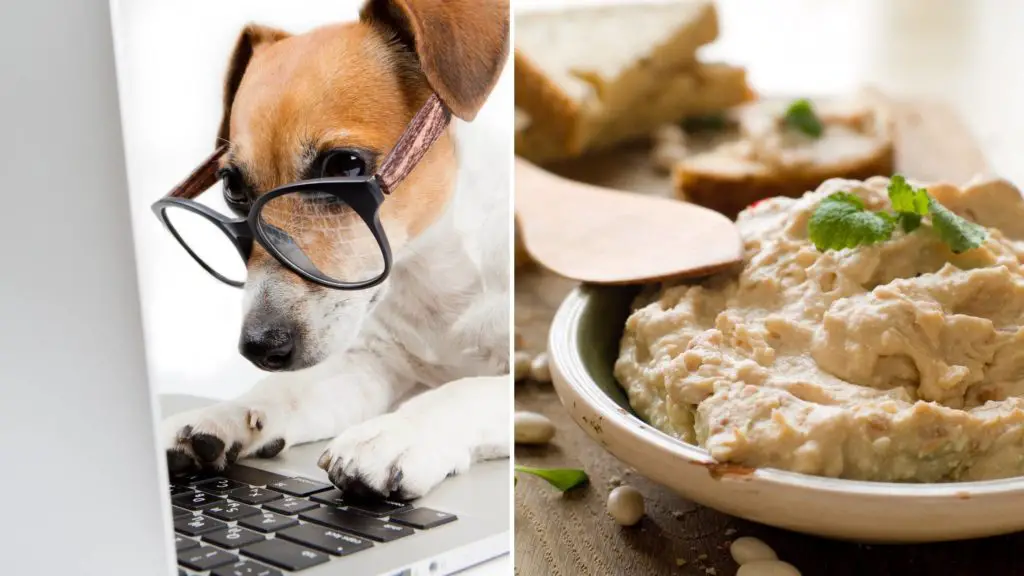
Can dogs eat hummus? The summary
One of the most confusing aspects of being a pet owner is the relationship between healthy foods for humans and dangerous foods for dogs. It can be frustrating and even frightening that there is plenty of overlap between the two categories.
Alongside educating yourself on which foods to avoid so you can keep your pup healthy, you’ll also need to put strategies in place at home to make sure those naughty paws don’t get hold of anything they shouldn’t.
Can dogs have hummus? Absolutely not, unless it’s homemade. But if you know that your preferred brand or recipe for hummus is bad for dogs, but it’s your number one choice of snack and it’s helping with your own healthy lifestyle, then you’ll need to keep it well out of reach. Most dogs are unlikely to be able to open your fridge and remove it, but remember once it’s out in your kitchen or dining room, that you should place it high up where your pup can’t reach it.
The fun doesn’t stop there though, especially with a dog prone to mischief. Does your four-legged friend have an annoying habit of getting into your trash? Whether you need to lock away your trash can in the pantry, use stair gates to keep your pup out of the room or simply use trash can straps, it’s important to halt your pup’s efforts if you know that he could get ill.
Pet Cinch offers a wealth of guidance on keeping your pup happy and healthy. Whether you’re looking for advice on can dogs eat hummus? or want to learn the best training tips for puppies, we’ve got you covered. Check out our informative blog, filled with expert guidance today.
References:
- Shape, ‘How Healthy Are Chickpeas, Really?’, https://www.shape.com/healthy-eating/diet-tips/chickpeas-nutrition-health-benefits, Accessed – 7 May 2021
- Encyclopedia, ‘Onions And Other Allium Plants’, https://www.encyclopedia.com/food/encyclopedias-almanacs-transcripts-and-maps/onions-and-other-allium-plants, Accessed – 7 May 2021

